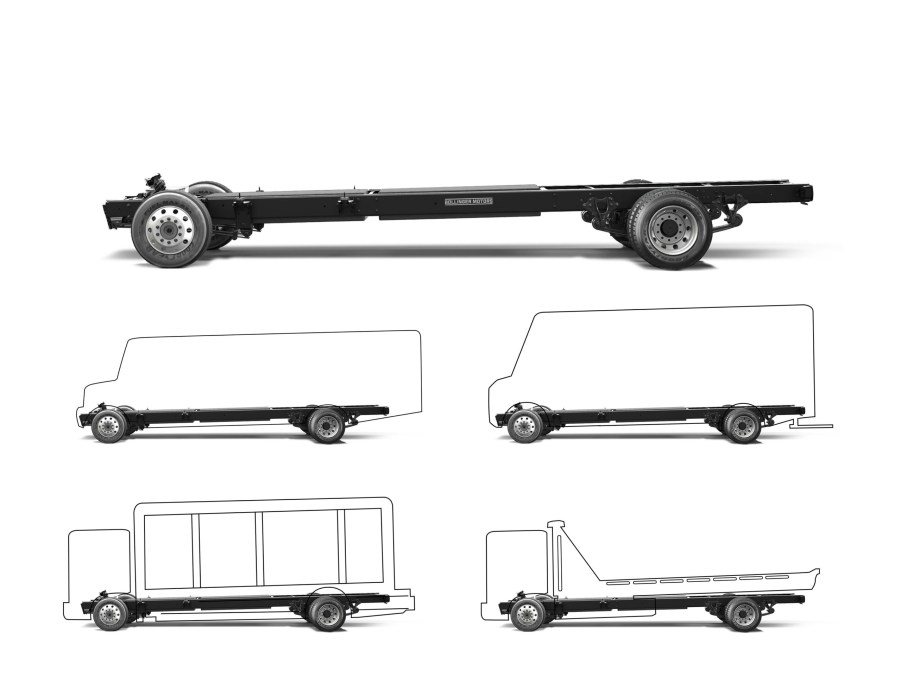
Bollinger Motors & Roush Partner up to Build Commercial EVs
Personal cars and trucks aren’t the only vehicles getting electrified nowadays. Commercial EVs hold a lot of promise, too, both for curbing emissions and generating business, which brings us to Bollinger Motors. Although the startup recently killed its electric truck and SUV plans, it never shuttered its commercial ones. And now those plans are one step closer to fruition thanks to Roush Industries.
Roush Industries is building Bollinger Motors’ commercial electric vehicles

At first glance, Roush Industries might seem like an odd choice for a commercial EV partner. However, while the company is practically synonymous with modified Mustangs, Roush isn’t just a tuner. Or rather, Roush Performance is just one branch of Michigan-based Roush Industries, which also provides testing, prototyping, and manufacturing services. And it’s that last part that’s of major importance to Bollinger Motors.
See, although it can design and test commercial EVs, the Michigan-based company isn’t set up for mass production. Before it canceled the planned B1 and B2, Bollinger was basically hand-building them. That’s fine for a boutique carmaker, but it’s nowhere near sufficient for a commercial vehicle company. Asking Bollinger Motors to satisfy its contracts would therefore be like asking a university chemistry lab if it could supply every U.S. pharmacy with Tylenol for a year.
So, rather than cause further delays and headaches by setting up a full production facility, Bollinger Motors contracted Roush Industries to build its commercial EVs. For the next two years, Bollinger will ship frame materials, batteries, motors, etc., from its Oak Park, MI headquarters to Roush’s Livonia facility. And once Roush assembles the parts into finished products, they get sent out to customers.
What kind of commercial EVs is Bollinger Motors planning?

Since it first showed off its commercial EV chassis in 2020, Bollinger Motors has refined its design and target audience. Going forward, the company’s skateboard platform will underpin a variety of Class 3, 4, 5, and 6 commercial vehicles. And Bollinger isn’t stopping at trucks; its contract with Roush Industries also includes chassis cabs and cargo vans.
It’s worth noting that Roush won’t install things like cranes or flatbeds on the electric chassis cabs, Automotive News says. Rather, it and Bollinger supply a bare chassis cab to the customer who then outfits it for a specific purpose. But since electric commercial trucks and vans are still novelties, outfitting options are rather limited. Hence why Bollinger also signed an agreement with a third company, EAVX, to be that outfitter, AN explains. So, after a customer orders their commercial EV and Roush assembles it, EAVX completes the final build as needed.
Speaking of orders, Bollinger Motors already has a client lined up. It’s building a series of Class 3 electric cargo vans for New York power company Con Edison, AN reports. And now that the assembly plans are inked, Bollinger might start attracting additional customers.
The commercial EV market is really heating up
As of this writing, Bollinger Motors hasn’t released pricing details for its commercial EVs. However, those Con Edison cargo vans should hit the road no later than 2024. Also, although it’s still finalizing specs, Bollinger previously said its scalable platforms would offer 70-, 140-, and 210-kWh battery pack options. Furthermore, it claims even the Class 6 platform should offer over 200 miles of range.
These Bollinger vans and trucks will need that range because they’re about to enter a competitive market. GM has commercial EV plans, too, for example. Meanwhile, Ford already has an electric cargo van available and is building up its commercial fleet charging network. Plus, Ram’s about to launch its electric cargo van. And let’s not forget Rivian’s Amazon vans.
Still, don’t be surprised if someday soon, you pass a Bollinger electric van or truck silently doing business.
Follow more updates from MotorBiscuit on our Facebook page.


